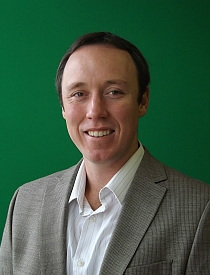
Dr. Ryan D. Stewart
Assistant Professor
Critical Zone Physics
Department of Crop & Soil Environmental Science
Ph.D. Water Resources Engineering, Oregon State University, 2013
M.S. Water Resources Engineering, Oregon State University, 2010
B.S. Mechanical Engineering, California Polytechnic State University, 2002
Link to Curriculum Vitae
Assistant Professor
Critical Zone Physics
Department of Crop & Soil Environmental Science
Ph.D. Water Resources Engineering, Oregon State University, 2013
M.S. Water Resources Engineering, Oregon State University, 2010
B.S. Mechanical Engineering, California Polytechnic State University, 2002
Link to Curriculum Vitae
Current Lab Members
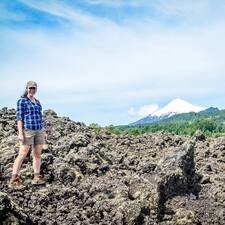
Jaclyn Fiola
Jaclyn joined the CZL in Fall of 2018 as a Ph.D. student (co-advised with Dr. Greg Evanylo, SPES). Jacyln is researching the important roles of vineyard soils in producing high quality grape fruits and wines. Jaclyn has the honor of being an ICTAS Doctoral Scholar, which provides a fellowship for exceptional Ph.D. applicants.
Jaclyn joined the CZL in Fall of 2018 as a Ph.D. student (co-advised with Dr. Greg Evanylo, SPES). Jacyln is researching the important roles of vineyard soils in producing high quality grape fruits and wines. Jaclyn has the honor of being an ICTAS Doctoral Scholar, which provides a fellowship for exceptional Ph.D. applicants.
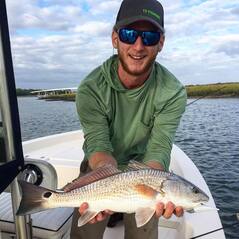
Ben Morrison
Ben joined the CZL in Fall of 2018 as an M.S. student. His research focuses on sustainable management of neonicotinoid pesticides in agro-ecosystems, including evaluating plant uptake of the compounds and role of soil properties on migration of these chemical compounds.
Ben joined the CZL in Fall of 2018 as an M.S. student. His research focuses on sustainable management of neonicotinoid pesticides in agro-ecosystems, including evaluating plant uptake of the compounds and role of soil properties on migration of these chemical compounds.
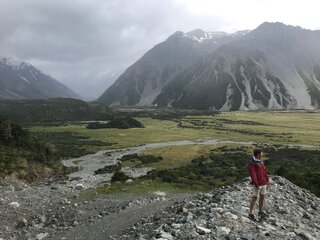
Jacob Maris
Jacob joined the CZL in Fall of 2019 as an M.S. student. His research also focuses on sustainable management of neonicotinoid pesticides in agro-ecosystems, with emphasis on field measurements and examining the influences of cover crops and vegetated buffer strips on contaminant mobility.
Jacob joined the CZL in Fall of 2019 as an M.S. student. His research also focuses on sustainable management of neonicotinoid pesticides in agro-ecosystems, with emphasis on field measurements and examining the influences of cover crops and vegetated buffer strips on contaminant mobility.
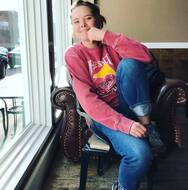
Taryn Thompson
Taryn joined the CZL in Fall of 2019 as an M.S. student. Her research examines how soil properties, including dynamic pore structures and salinity, control greenhouse gas emissions in agricultural soils.
Taryn joined the CZL in Fall of 2019 as an M.S. student. Her research examines how soil properties, including dynamic pore structures and salinity, control greenhouse gas emissions in agricultural soils.
Former Lab Members
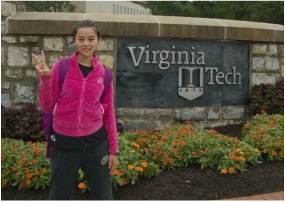
Jingjing Chen
Jingjing joined the CZL in Fall of 2014 as a Ph.D. student, and successfully defended her dissertation in November 2018. Her research focuses on how soil physical properties such as surface area, charge, and structure control the transport of pollutants. Her hobbies include site-seeing and hiking, and she hopes to try skydiving for the first time while here in the United States. Jingjing has the honor of being an ICTAS Doctoral Scholar, which provides a fellowship for exceptional Ph.D. applicants.
Jingjing joined the CZL in Fall of 2014 as a Ph.D. student, and successfully defended her dissertation in November 2018. Her research focuses on how soil physical properties such as surface area, charge, and structure control the transport of pollutants. Her hobbies include site-seeing and hiking, and she hopes to try skydiving for the first time while here in the United States. Jingjing has the honor of being an ICTAS Doctoral Scholar, which provides a fellowship for exceptional Ph.D. applicants.
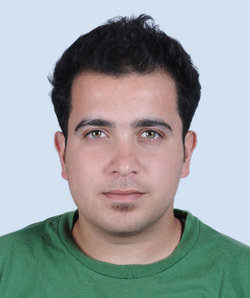
Ayush Gyawali
Ayush joined the CZL in Winter of 2015 as a Ph.D. student, and graduated in April 2019. His research focuses on how different agricultural management practices such as conservation tillage and cover cropping affect the physical, chemical and biological properties of soil.
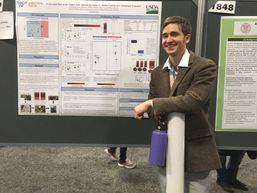
Jesse Radolinski
Jesse joined the CZL in Fall of 2015 first as a M.S. student who transitioned into a direct-to-Ph.D. program. In his research he studies contaminant hydrology, focusing on the important role of soil structure on movement of emerging contaminants such as neonicotinoid pesticides and antibiotics. Jesse defended his dissertation in September 2019.
Jesse joined the CZL in Fall of 2015 first as a M.S. student who transitioned into a direct-to-Ph.D. program. In his research he studies contaminant hydrology, focusing on the important role of soil structure on movement of emerging contaminants such as neonicotinoid pesticides and antibiotics. Jesse defended his dissertation in September 2019.
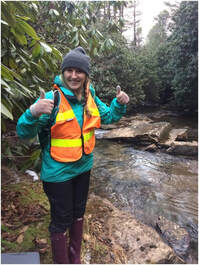
Gracie Erwin
Gracie is an M.S. student that started in Fall 2017 (co-advised with Dr. Daniel McLaughlin, FREC). Gracie studies water and soil quality in a first-order headwater catchment in Southwest Virginia, specifically looking at possible effects due to large-scale (6,000 acre) prescribed fire. She defended her M.S. thesis in May 2019.
Gracie is an M.S. student that started in Fall 2017 (co-advised with Dr. Daniel McLaughlin, FREC). Gracie studies water and soil quality in a first-order headwater catchment in Southwest Virginia, specifically looking at possible effects due to large-scale (6,000 acre) prescribed fire. She defended her M.S. thesis in May 2019.
Student Opportunities
Role of Graduate Students
Graduate school is a time to develop skills which will enable students to achieve future success. In addition to the knowledge gained from coursework and research, students will improve their abilities in critical thinking, scientific reasoning, reading comprehension, and effective writing and presenting. As an advisor, I strive to maintain a positive scholastic environment, and work to promote each individual student’s growth and success.
Graduate students are vital contributors to the overall direction and vigor of the Critical Zone Research group. I am always looking for motivated and hard-working graduate students to join the research group and help advance the understanding of critical zone processes. I accept graduate students at both the M.S. and Ph.D. levels, and do my best to work with students in finding the best match between their individual interests and the activities and direction of the overall research group.
Undergraduate Research
Active participation in a research group is one of the most rewarding experiences a student can have during their undergraduate education. Performing undergraduate research allows students the chance to apply their classroom knowledge and to develop new and exciting skills and connections. Undergraduate students with research experience generally are more competitive applicants for positions in both grad school and in industry. Therefore, I am always developing research opportunities for undergraduate students that are interesting and worthwhile. Please contact me to discuss undergraduate research opportunities in greater detail.
Funding
I will assist students in finding and applying for funding sources, including fellowships and scholarships made available through Virginia Tech, the National Science Foundation, and the USDA. There are also research assistantship opportunities available for students coming in at the Ph.D. level.
Graduate school is a time to develop skills which will enable students to achieve future success. In addition to the knowledge gained from coursework and research, students will improve their abilities in critical thinking, scientific reasoning, reading comprehension, and effective writing and presenting. As an advisor, I strive to maintain a positive scholastic environment, and work to promote each individual student’s growth and success.
Graduate students are vital contributors to the overall direction and vigor of the Critical Zone Research group. I am always looking for motivated and hard-working graduate students to join the research group and help advance the understanding of critical zone processes. I accept graduate students at both the M.S. and Ph.D. levels, and do my best to work with students in finding the best match between their individual interests and the activities and direction of the overall research group.
Undergraduate Research
Active participation in a research group is one of the most rewarding experiences a student can have during their undergraduate education. Performing undergraduate research allows students the chance to apply their classroom knowledge and to develop new and exciting skills and connections. Undergraduate students with research experience generally are more competitive applicants for positions in both grad school and in industry. Therefore, I am always developing research opportunities for undergraduate students that are interesting and worthwhile. Please contact me to discuss undergraduate research opportunities in greater detail.
Funding
I will assist students in finding and applying for funding sources, including fellowships and scholarships made available through Virginia Tech, the National Science Foundation, and the USDA. There are also research assistantship opportunities available for students coming in at the Ph.D. level.
